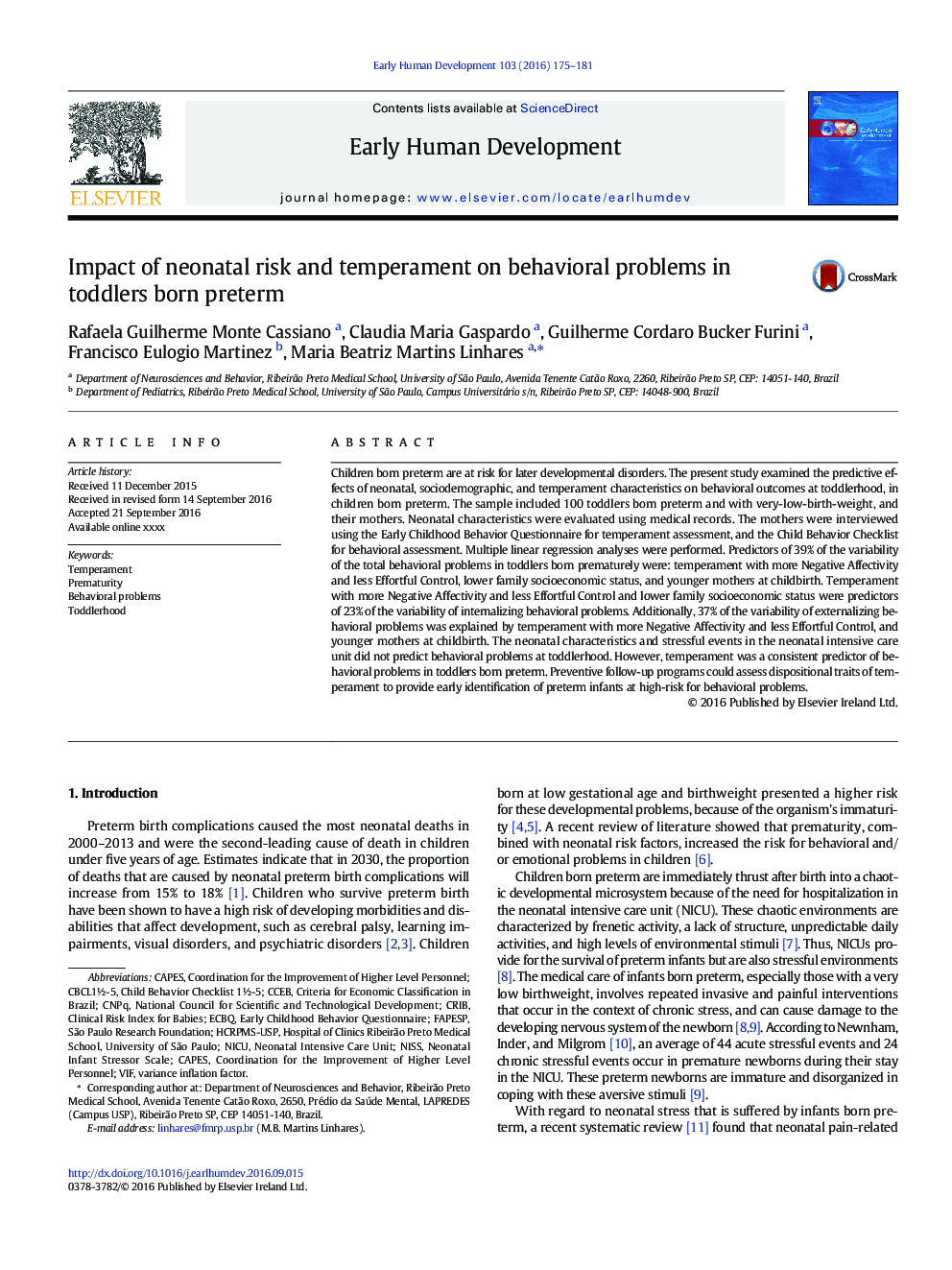| کد مقاله | کد نشریه | سال انتشار | مقاله انگلیسی | نسخه تمام متن |
|---|---|---|---|---|
| 8777772 | 1599463 | 2016 | 7 صفحه PDF | دانلود رایگان |
عنوان انگلیسی مقاله ISI
Impact of neonatal risk and temperament on behavioral problems in toddlers born preterm
ترجمه فارسی عنوان
تأثیر ریسک نوزادان و خلق و خوی بر مشکلات رفتاری کودکان مبتلا به زودرس
دانلود مقاله + سفارش ترجمه
دانلود مقاله ISI انگلیسی
رایگان برای ایرانیان
کلمات کلیدی
VIFCNPqNISSFAPESPNational Council for Scientific and Technological DevelopmentSão Paulo Research FoundationNICU - بخش NICUTemperament - دماغprematurity - زودرسClinical Risk Index for Babies - شاخص خطر بالینی برای نوزادانVariance inflation factor - فاکتور تورم واریانسcapes - قوطی هاBehavioral problems - مشکلات رفتاریneonatal intensive care unit - واحد مراقبت های ویژه نوزادانToddlerhood - کودک نو پاCRIB - گهواره
ترجمه چکیده
کودکان مبتلا به نارسایی زودرس در معرض خطر اختلالات رشدی بعدی هستند. در مطالعه حاضر، اثرات پیش بینی شده از ویژگی های نوزادان، جامعه شناختی و ذهنی بر پیامدهای رفتاری کودک مبتلا به زودرس نوزادان متولد شده است. نمونه شامل 100 کودک مبتلا به زودرس و با وزن بسیار کم وزن و مادرانشان بودند. ویژگی های نوزادان با استفاده از پرونده های پزشکی مورد ارزیابی قرار گرفت. مادران با استفاده از پرسشنامه رفتارهای ابتدایی کودک برای ارزیابی خلق و بررسی فهرست رفتار کودک برای ارزیابی رفتاری مصاحبه شدند. تجزیه و تحلیل رگرسیون چندگانه انجام شد. پیش بینی کننده های 39٪ از تغییرات مجموع مشکلات رفتاری کودکان مبتلا به زودرس زودرس، عبارت بودند از: خلق و خوی با تأثیر مثبت منفی و کمتر کنترل زودرس، وضعیت اقتصادی اجتماعی پایین خانواده و مادران جوان در زایمان. دمایی با تأثیر مثبت منفی و کمتر کنترل کنترلی و وضعیت اقتصادی اجتماعی خانواده پایینتر، پیش بینی کننده 23 درصد متغیرهای درونی سازی مشکلات رفتاری بود. علاوه بر این 37٪ از متغیری از مشکلات بیرونی رفتاری با خلق و خوی با نفوذ منفی بیشتر و کنترل کمتر موفق، و مادران جوان در هنگام زایمان توضیح داده شده است. ویژگی های نوزادان و وقایع استرس زا در بخش مراقبت های ویژه نوزادان، مشکلات رفتاری در دوران کودکی را پیش بینی نمی کنند. با این حال، خلق و خوی یک پیش بینی ثابت از مشکلات رفتاری در کودکان نوپا زاده زودرس بود. برنامه های پیگیری پیشگیرانه می توانند ویژگی های رفتاری خلقی را برای شناسایی زودهنگام نوزادان نارس در معرض خطر بالا برای مشکلات رفتاری ارزیابی کنند.
موضوعات مرتبط
علوم پزشکی و سلامت
پزشکی و دندانپزشکی
زنان، زایمان و بهداشت زنان
چکیده انگلیسی
Children born preterm are at risk for later developmental disorders. The present study examined the predictive effects of neonatal, sociodemographic, and temperament characteristics on behavioral outcomes at toddlerhood, in children born preterm. The sample included 100 toddlers born preterm and with very-low-birth-weight, and their mothers. Neonatal characteristics were evaluated using medical records. The mothers were interviewed using the Early Childhood Behavior Questionnaire for temperament assessment, and the Child Behavior Checklist for behavioral assessment. Multiple linear regression analyses were performed. Predictors of 39% of the variability of the total behavioral problems in toddlers born prematurely were: temperament with more Negative Affectivity and less Effortful Control, lower family socioeconomic status, and younger mothers at childbirth. Temperament with more Negative Affectivity and less Effortful Control and lower family socioeconomic status were predictors of 23% of the variability of internalizing behavioral problems. Additionally, 37% of the variability of externalizing behavioral problems was explained by temperament with more Negative Affectivity and less Effortful Control, and younger mothers at childbirth. The neonatal characteristics and stressful events in the neonatal intensive care unit did not predict behavioral problems at toddlerhood. However, temperament was a consistent predictor of behavioral problems in toddlers born preterm. Preventive follow-up programs could assess dispositional traits of temperament to provide early identification of preterm infants at high-risk for behavioral problems.
ناشر
Database: Elsevier - ScienceDirect (ساینس دایرکت)
Journal: Early Human Development - Volume 103, December 2016, Pages 175-181
Journal: Early Human Development - Volume 103, December 2016, Pages 175-181
نویسندگان
Rafaela Guilherme Monte Cassiano, Claudia Maria Gaspardo, Guilherme Cordaro Bucker Furini, Francisco Eulogio Martinez, Maria Beatriz Martins Linhares,
